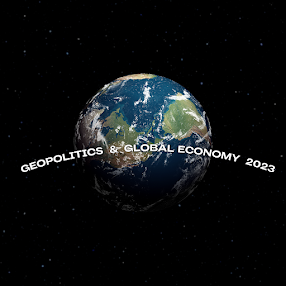Global Tug of War: 2023 Geopolitics
Geopolitics is the study of how geography, economics, and politics intersect to shape the behavior of nations and the world. In recent years, geopolitical tensions have risen, with the potential to threaten the global economy. Unfortunately, it appears that this trend will continue into 2023. In this blog, I'll explore some of the ways that geopolitics may impact the global economy in the coming year.
2023 Global Geopolitical Forecast
Global Health
Global health issues can have geopolitical and economic implications. The COVID-19 pandemic has highlighted the interconnectedness of the global economy and the importance of addressing health issues on a global scale. In 2023, we may see continued efforts to address the pandemic as well as other global health issues such as the rise of antibiotic-resistant bacteria and the spread of other infectious diseases.
Global War
The greatest risks to the world economy in 2023 and beyond could come from the war in Ukraine. Energy and food prices have sharply increased as a result of Russia's invasion of Ukraine, creating financial problems for businesses and skyrocketing living expenses for individuals in 2022. In 2023, uncertainty, a widening of the war, and its effects—particularly on the world's commodity markets—will persist because a short-term de-escalation is uncertain.
Political Instability
Political instability is a major geopolitical issue that can have a significant impact on the global economy. Political turmoil can lead to uncertainty for businesses and investors, making it difficult to plan and invest for the future. In 2023, several countries are likely to experience political instability, including Ukraine, Russia, and Afghanistan. This instability can lead to economic disruptions, particularly in countries that are heavily reliant on exports.
Energy Security
Energy security is another area where geopolitics can have a major impact on the global economy. The global energy landscape is changing rapidly with the rise of renewable energy sources and the shift away from fossil fuels. This shift is likely to create winners and losers, with some countries benefiting from the transition while others struggle to adapt. Countries that are heavily reliant on oil and gas exports may face significant challenges in the coming years, particularly as demand for these products declines.
Trade Wars
Trade wars have been a major geopolitical issue in recent years, with the United States and China engaging in a tit-for-tat series of tariffs and counter-tariffs. These trade wars have led to increased costs for businesses and consumers, as well as disruptions in global supply chains. Unfortunately, it appears that trade tensions are unlikely to ease in 2023 as countries continue to seek to protect their domestic industries and markets.
Climate Change
Climate change is another geopolitical issue that has the potential to threaten the global economy. The effects of climate change, including rising sea levels, extreme weather events, and food shortages, can have a significant impact on economic growth and stability. In 2023, we are likely to see continued efforts to address climate change, including the implementation of policies to reduce greenhouse gas emissions and the promotion of renewable energy sources.
Cybersecurity
Cybersecurity is a growing geopolitical issue that can have significant economic implications. Cyberattacks can disrupt critical infrastructure, steal sensitive information, and cause significant financial losses for businesses and individuals. In 2023, we are likely to see continued efforts by governments and businesses to strengthen cybersecurity measures and prevent cyberattacks, but the risk of a major cyber incident remains high.
Migration
Migration is one more geopolitical issue that can have economic implications. Large-scale migration can create social and economic disruptions, particularly in countries that are ill-equipped to handle the influx of people. In 2023, we may see increased migration due to a variety of factors, including climate change, political instability, and economic hardship. This could lead to increased tensions between countries and regions, as well as economic challenges for affected countries.
Geopolitical Competition
Competition between major powers, such as the United States, China, and Russia, can have significant economic implications. In 2023, we are likely to see continued competition between these powers as well as regional powers such as Iran and Saudi Arabia. This competition can lead to increased military spending, trade tensions, and political instability.
Resource Scarcity
Resource scarcity, particularly of vital resources such as water, can create geopolitical tensions and economic challenges. In 2023, we may see increased competition for resources in regions that are experiencing water scarcity or other resource challenges. This could lead to increased tensions between countries and regions, as well as economic challenges for affected countries.
Disinformation
Disinformation, or the spread of false or misleading information, can have significant geopolitical and economic implications. Disinformation can lead to increased tensions between countries and regions, as well as economic disruptions. In 2023, we are likely to see continued efforts to combat disinformation, but the risk of false or misleading information spreading remains high.
A Wrap-Up
Overall, it is clear that geopolitics will continue to be a major factor in the global economy in 2023. The interconnectedness of the global economy means that disruptions in one part of the world can have far-reaching economic implications. As such, it is essential that governments, businesses, and individuals work together to mitigate the risks associated with geopolitical tensions and promote a more stable and prosperous global economy.






Good one 👍
ReplyDeleteThank you !!! ❤️
Delete